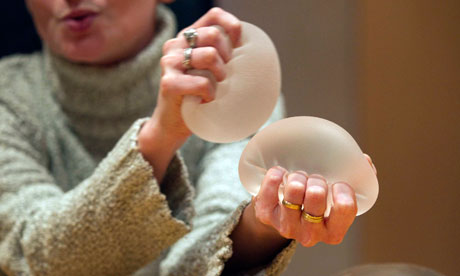
The lawyer acting for 250 women in the UK who are suing over faulty breast implants has lambasted the national regulator for its handling of the situation.
Mark Harvey, a partner with Hugh James solicitors in Cardiff, said the Medicines and Healthcare Products Regulatory Authority (MHRA) had failed to take women's concerns seriously since he began bringing cases to their attention 18 months ago. He also blamed the regulator for allowing the defective implants to be sold in the UK in the first place.
Around 40,000 women in the UK have received breast implants made by PIP (Poly Implant Prosthesis), which were banned by the French authorities and then by the MHRA in March last year because they had a high rate of rupture and were found to have been filled with a low grade of silicone gel, also used in mattresses.
After the death of one woman from a rare cancer and reports of other cancer cases, the French government has said it will advise removal of all the implants if an inquiry due to report back on Friday confirms a cancer link.
But the MHRA has advised women not to panic. "MHRA's current advice to women with PIP breast implants continues to be that should they have any questions about their breasts or implants, they should seek clinical advice from their implanting surgeon. There is currently no evidence to support routine removal of PIP breast implants," it said in a statement.
Harvey said he held the MHRA responsible for allowing the import of the faulty product in the first place. PIP, he told the Guardian "had form". In December 2000, the regulator had banned the use of hydrogel implants, made by PIP, saying "the manufacturer's biological safety assessment of this product is inadequate, due to the lack of long-term toxicity data or clinical follow-up, together with methodological flaws in some of the pre-clinical tests." It was uncertain how the hydrogel filler would behave.
When some of the 4,000 women who had received hydrogel implants sued, PIP's insurers refused to pay compensation awarded by the UK courts.
"PIP has been able to come back into this country with a defective product and walk away again," said Harvey. The company went into liquidation in 2010, which meant it could not be sued.
The lawyer said he had tried to persuade the MHRA to meet his clients over the past year or more without success and that the regulator had refused to share the results of tests on the sub-standard silicone gel implants.
"I have written again to the MHRA to urge them to react to the developments in France and, similarly to France, to set up a suitable protocol for women affected in this country," said Harvey.
"I do not believe that the MHRA's reaction to date has been satisfactory; it is unbelievable that the MHRA have not ensured that they were involved with the consultations in France about a product that affects such a large amount of women in this country.
"I am and have been very critical of their role throughout the history of this product. This stems from allowing this company to sell these implants in the UK in the first place, their refusal to respond when I alerted them to the problems, their refusal to meet with any of my clients to discuss their concerns and now this latest health concern."
But the Independent Healthcare Advisory Services, representing private clinics where most women had their breast implants, praised the MHRA's handling of the problem.
"We are pleased to see that health and regulatory experts from the Netherlands, Portugal, Italy, Ireland, Hungary, Austria, Denmark, Malta and Australia have all confirmed no evidence of any increase in incidents of cancer associated with PIP breast implants and no evidence of any disproportionate rupture rates. France are looking increasingly isolated in their stance and their pre-emptive statements have caused unnecessary alarm," said director Sally Taber in a statement.
She added that women should consider the risks involved in any surgery under general anaesthetic before asking for their implant to be removed.
Medical experts, meanwhile, said that there was no evidence the implants could cause serious harm.
Douglas McGeorge, consultant cosmetic surgeon ex-president of the British Association of Aesthetic Plastic Surgeons, said it was "unclear" why the French government had suggested it might cover the cost of replacing the implants of French women – which it has said it may do if there is proof of a cancer link.
"There is no medical evidence that these implants need immediate replacement. The current guidelines are that individuals with PIP implants should go back to their treatment facility, where the integrity of the implants can be assessed and a regime for monitoring planned. Clearly many patients may choose to have something done in advance of implant failure, knowing the problems associated with these implants," he said.

